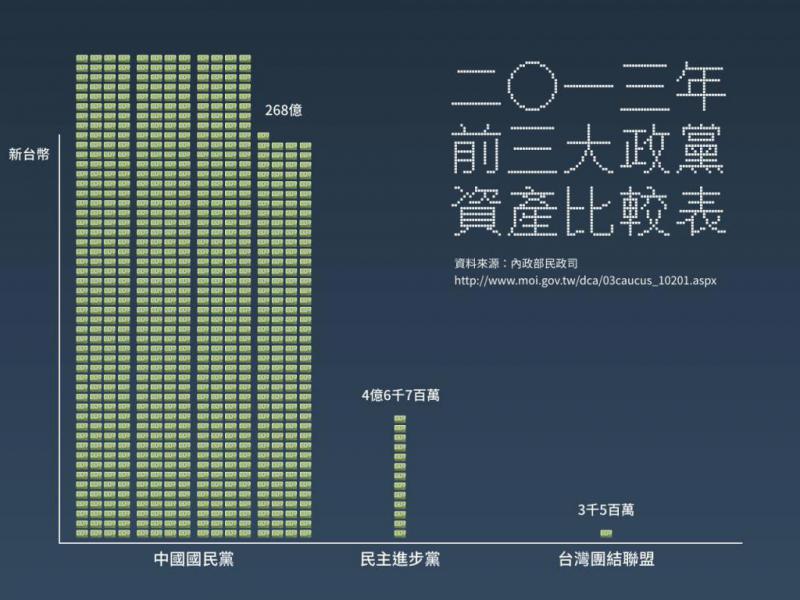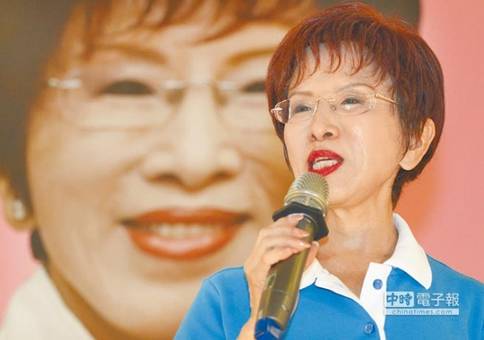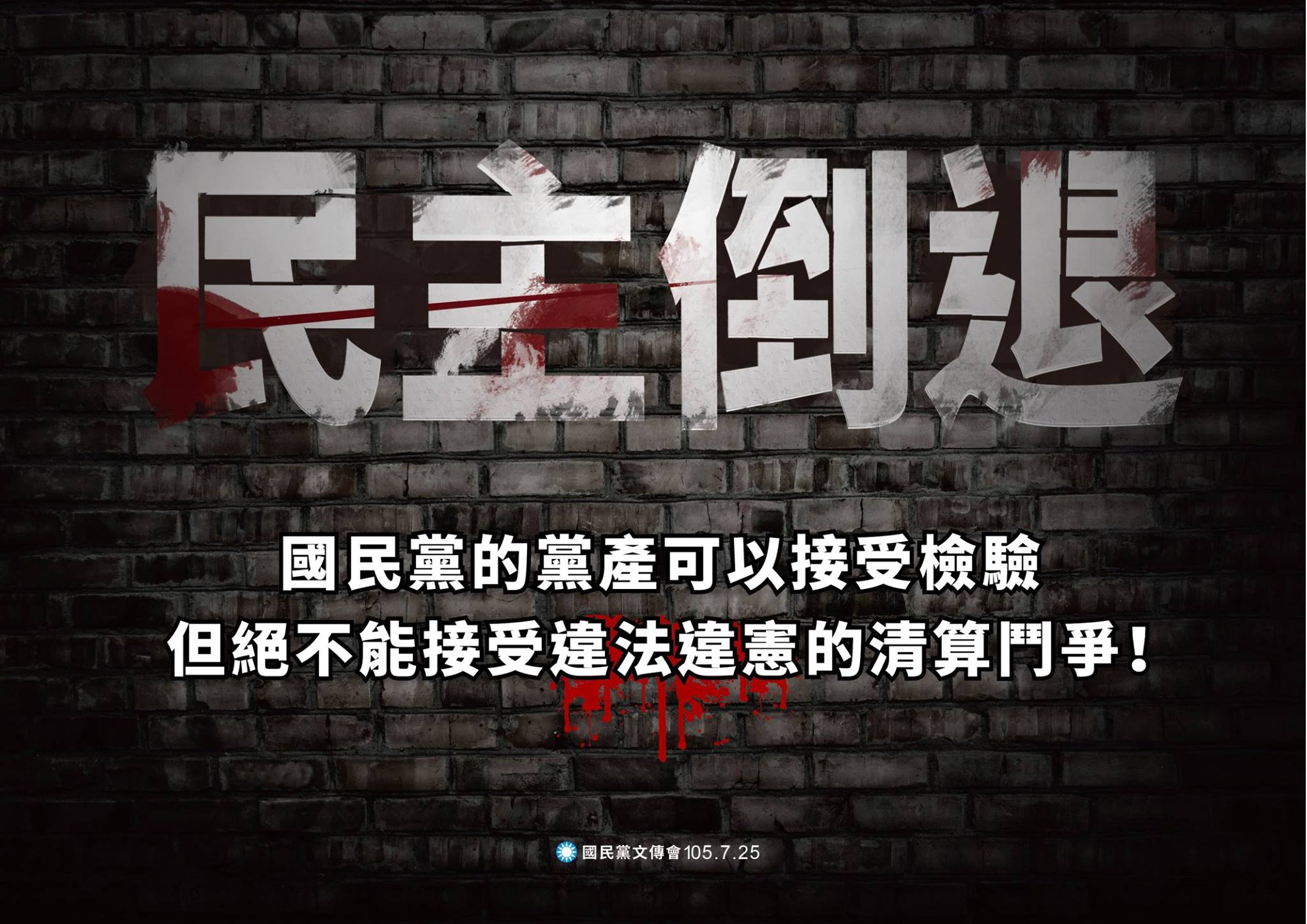by Brian Hioe
語言:
English
Photo credit: KMT.Exposed
THE PARTY ASSETS bill targeting illegally acquired party assets of the KMT passed its third reading last night in the Legislative Yuan. The bill will declare all assets of political parties acquired since 1945 which were not acquired through members’ dues or political donations to be illegal. Such assets must be handed over to the state.
The passing of the bill, then, comes out of the long struggle to pass legislation aimed at reducing KMT party assets. KMT party assets include seized property dating back from the authoritarian period, making them a legacy of the authoritarian period. It is common within public discourse in Taiwan to claim that the KMT is the world’s richest political party. Certainly, the DPP has never had comparable resources, reporting only 1/3 of the KMT’s income in 2015.
 Infographic of the KMT’s party assets as compared to those of other political parties in Taiwan. Photo credit: KMT.Exposed
Infographic of the KMT’s party assets as compared to those of other political parties in Taiwan. Photo credit: KMT.Exposed
Though such a claim would be hard to establish, except through negative evidence, there is no denying the existence of substantial party assets by the KMT, which are holdings in everything from news agencies, construction companies, hospitals, and karaoke to 870 pieces of real estate scattered across Taiwan from Taipei to Kaohsiung, though seemingly concentrated in Taipei. Total assets in 2014 totaled 26.8 billion NTD ($892.4 million USD), which generated 981.52 million NTD in interest that year.
However, there is much murkiness about KMT party assets, because of the possibility of the use of dummy companies or offshore holdings to hide funds, and fluctuating estimations of their total amount. The KMT’s party assets were estimated to be between 200 and 500 billion NTD in the early 2000s and there being even larger claims by Wealth Magazine (財訊月刊) in 2000 that KMT assets could be as high as 600 billion. There were, in fact, past accusations within the KMT against Ma Ying-Jeou that he embezzled the missing 170 billion which disappeared if KMT assets are now only 27 billion in KMT assets. Accusations of Ma embezzling have been longstanding and may reflect internal party conflict more than actual corruption on the part of Ma. But the KMT itself claims to have had 62.8 billion NTD in 2000, which declined to 23 billion NTD in 2006, as a result of losses.
The passage of the party assets bill comes after no months of backbending by the KMT to try and halt or to stop the bill, with the KMT resorting to stalling tactics including physical obstruction which seem more characteristic of the DPP in its many years as a political opposition than anything else. Throughout, the KMT has attempted to portray the DPP attempting to settle the party assets issue as the DPP attempting to carry out political revenge against the KMT.
 Hung Hsiu-Chu, chairwoman of the KMT. Photo credit: China Times
Hung Hsiu-Chu, chairwoman of the KMT. Photo credit: China Times
The passage of the bill thus required the DPP calling a special legislative session to pass. With the passage of the bill, DPP legislators immediately held up placards expressing their support of the passage, and KMT legislators would hold up placards expressing their disapproval. Firecrackers were also set off outside the Legislative Yuan by individuals celebrating the passage of the bill. Lin Te-Fu of the KMT would later declare this the “darkest night of Taiwanese democracy” and claim that democracy in Taiwan had taken a step back through the actions of the DPP. This is, of course, ironic, given that the attempt of settling the party asset issue is to even the political playing field in Taiwan, as befits a democracy. Despite no longer being the sole ruling political party, the KMT’s party assets give it a political advantage over other political parties which return to its history of past authoritarian rule. This allowed the KMT to campaign during past 2016 elections at a deficit for example, making it the only political party in Taiwan which did so.
And it would also be that KMT evidences its continued disrespect for democracy in its refusal to settle the party assets issue on its own and then turning around and accusing the DPP of acting in an authoritarian manner. In part, this continues the trend of political ossification by the KMT, with the party seeing itself under attack from all quarters and taking a hard line in response, rather than realizing that this indicates a need for internal reform. One thinks that if the KMT had taken care of the longstanding issue of party assets on its own—rather than making occasional performative gestures at settling the party issues which were seen as hypocritical, such as selling off some assets and donating them to the government or claiming that assets were run in trust and not by the party—the fallout need not have been so bad for the KMT. Yet this was not to be so. The KMT continues to be unable to reform from within, due to the ascendance of party hardliners to its political leadership. But the KMT’s inability to reform may be to the ultimate benefit of Taiwanese democracy if it means the possibility of a political spectrum without the KMT.
 Image released by the KMT following passage of the party assets bill, claiming that democracy had taken a step back in Taiwan. Photo credit: KMT
Image released by the KMT following passage of the party assets bill, claiming that democracy had taken a step back in Taiwan. Photo credit: KMT
The DPP previously tried to address the party assets issue during the presidency of Chen Shui-Bian, but it would be to Tsai Ing-Wen’s credit and that of the current DPP-dominated legislature if they were able to settle the issue so early in the Tsai administration. Settling the party assets issue would be a historic step forward for Taiwanese democracy. However, now it remains to see as to whether the measures passed by the bill are strong enough to pry the KMT apart from its ill-gained assets, as well as to the actual enforcement of the bill. The KMT likely has many ways it can continue to divert its existing resources away from the grasp of law enforcement.
If the KMT has gone to extreme step of claiming this to be the “darkest night of Taiwanese democracy”, it may be that the KMT attempts to launch protests against the party assets bill in the near future. This only further demonstrates how out of touch the KMT is with political reality. Nevertheless, we will see as to what future actions of the KMT, except that they may continue to be self-marginalizing of the KMT from the Taiwanese public in the future.

